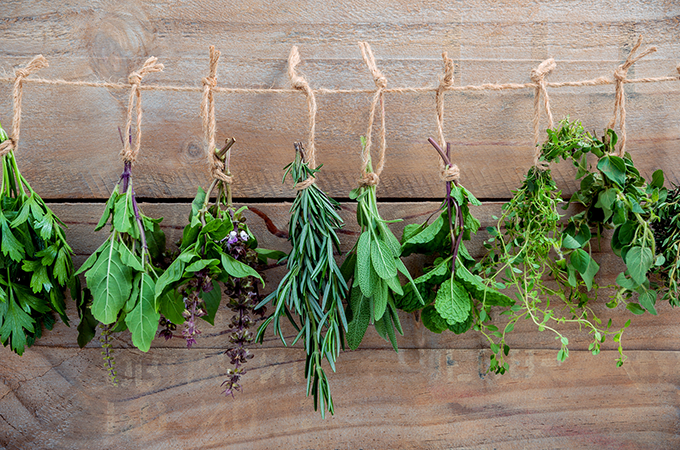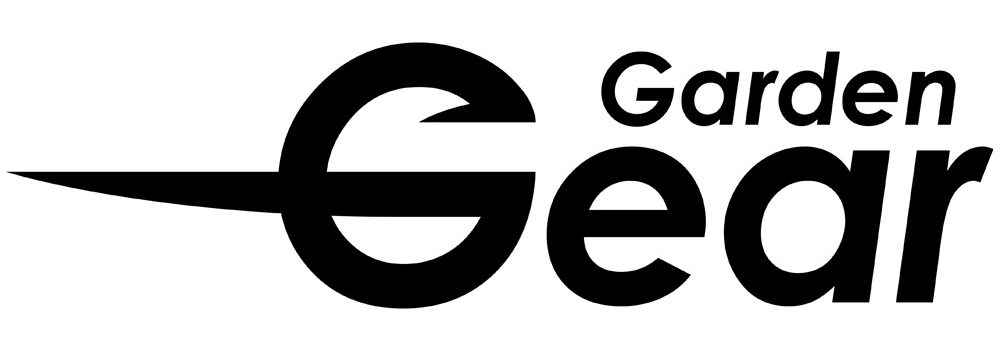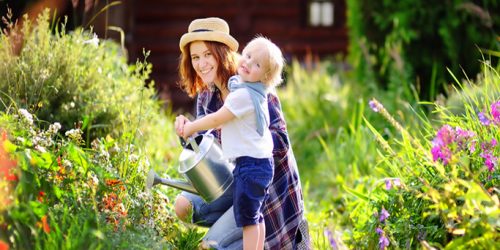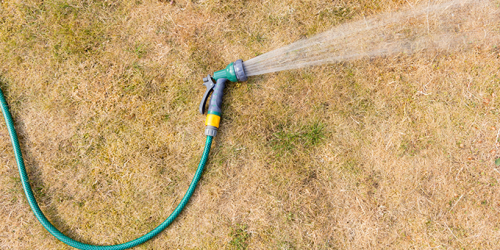Essential herbs to grow in your kitchen garden

There’s nothing as satisfying as eating food that you’ve grown yourself from the comfort of your own garden. The fresher the ingredients, the better – so why not grow your very own kitchen herb garden?
Below are just a few suggestions for what you could grow in your herb garden. Whether you grow them from seed or from ready potted seedlings, there’s something to suit every cook and gardener.
Basil

Originating from the Mediterranean, basil has become a popular herb in the kitchen, and is used in many a British dish. Coming from warm climates, it will thrive in plenty of sunlight and warmth, but can only be grown outside during the summer months. Choose a sheltered spot that gets plenty of sunlight and your basil is sure to flourish.
Any hint of frost will kill off this tender annual, so if your garden weather is a little on the unpredictable side, your basil will grow just as well in a pot in the greenhouse or on the windowsill indoors. Remember to rotate its pot 90° each day, as otherwise the leaves will only grow in one direction to try and reach the sunlight. By turning the pot every now and again you’ll be encouraging the leaves to grow evenly.
Bay

There’s an endless amount of recipes you can use bay leaves for. As bay trees, if well looked after, can easily live up to 20 years in pots – or 50 years if in the ground – this is one herb that is well worth investing your attention and care into.
While it is a fairly hardy plant and can withstand a small degree of frost, if you can choose to keep it in pots you can easily move it closer to a heated wall of your home to give it extra protection. Remember never to bring your bay tree inside, though, as this will significantly damage. It doesn’t like harsh winds or waterlogged roots, either – so ensure that its pot can drain easily of excess water.
A potted bay will thrive if pruned regularly. Trim it to shape in the summer to encourage more growth, and remove any bay suckers from the leaves as they appear.
Chives

This fantastic herb is a versatile plant to have in your garden arsenal. You can use it in its entirety in cooking; green stems; flowers; even the bulb. It’s even one of the easiest herbs to grow, so you should definitely have chives in your garden if you love its tasty cousin the onion.
Chives are a wonderfully low maintenance perennial; once planted, all they really need to blossom is rich, moist soil and plenty of sunlight. They’ll grow best in spots that get at least four or five hours a day of sunlight – make sure to water them regularly. You can sow them directly from seed either into the ground or into pots during March or April.
Common mint

Did you know that common mint gets its name from the Greek nymph Minthe? Also known as spearmint, mint will be eager to take over your garden if planted directly into your borders. Which is fine if you really, really like mint – but if you’d rather have plenty of room for your other herbs, we’d suggest keeping it in pots near your kitchen so you can grab some as and when you need it.
A wonderfully hardy herb, mint can pretty much look after itself once planted. It only really needs moist, fertile soil, and plenty of sunlight. Mint will be the perfect accompaniment for your Sunday roast in some delicious homemade mint sauce!
Coriander

A favourite particularly in Asian and Thai cooking, coriander is a must-have if you like your cooking to have a little extra kick. This tender annual is better grown in pots on your windowsill, but you can also grow it in your garden borders if you wish to. As it’s a fairly short-lived herb, make sure to sow it every few weeks if you want a regular supply.
Coriander can ‘bolt’ when stressed; this means it will stop producing those tasty leaves, and sprout flowers and seeds instead. Harvest coriander regularly for the best results, and keep it well-watered. If you want to plant it outdoors, try to choose a partially shady spot, as this will encourage it to be more productive.
Dill

Fan of seafood? Then you’ll certainly want some dill in your herb garden. This tasty annual will complement your favourite salmon dishes – alongside a chilled glass of white wine, of course.
Dill hates being transplanted, so ensure that you know exactly where you want to plant it; either in the ground or in pots if you plan on moving it later on. If planting your dill in pots, make sure to use multi-purpose compost. Try and grow dill in partial shade if you can, as this will stop it from early seed setting, which can bring cropping to an end.
How many of these flavourful herbs have you got in your kitchen garden? Let us know over on our Facebook page.
Lead image: Kerdkanno via Getty Images.






